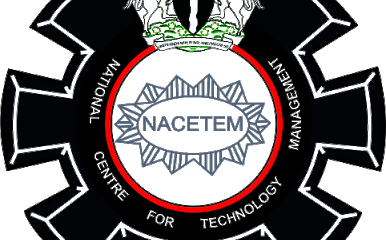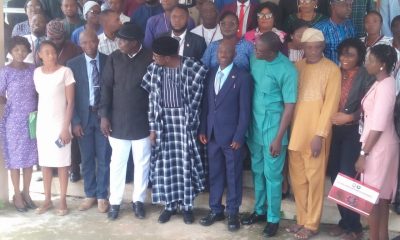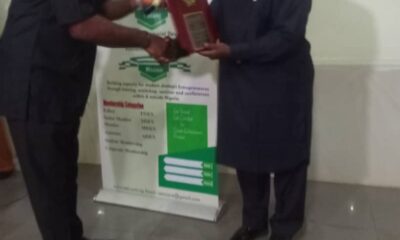News
Research, Innovation Panacea For Economic Growth– Minister
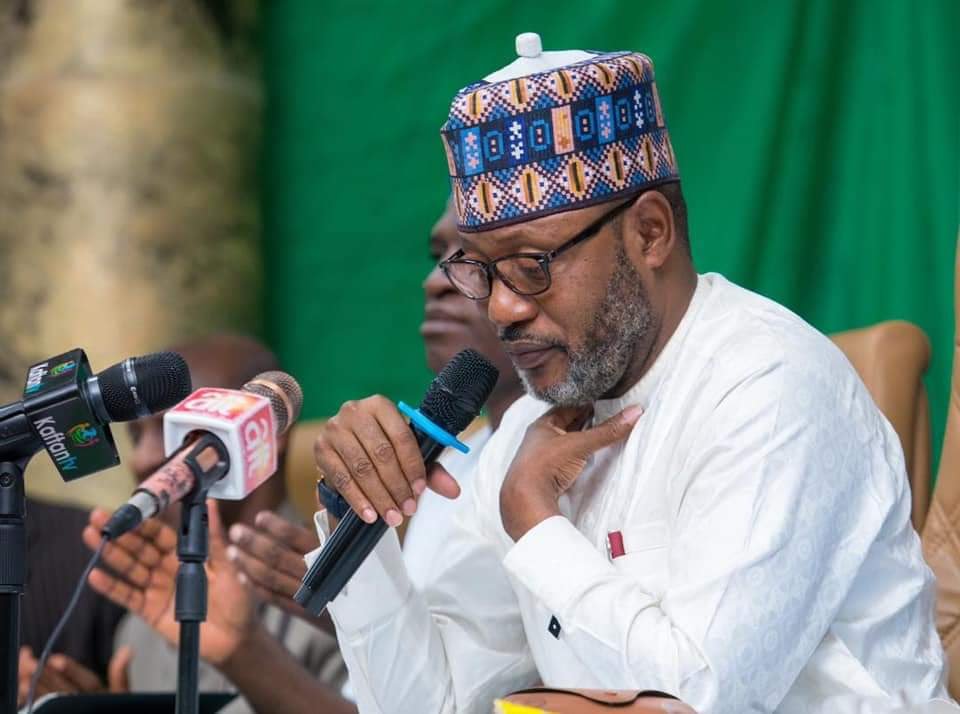
By Ayobami Agboola, Osogbo
The Honourable Minister Of State For Federal Ministry of Science and Technology, Dr. Mohammed Abdullahi, on Monday identified research and innovation as panacea for Nation’s economy woes.
Dr Abdullahi stated this while delivering his keynote address at the ceremony of the Virtual workshop Government-industry-academia (Gia) Linkage organized By National Centre For Technology Management (NACETEM).
He posited that there is no better time for research than now when Nigerians are trying to look inwards to find alternatives by use of locally developed technologies, adding that Research and Innovation has the potential of growing the economy.
The Minister said: “It is pertinent to emphasize that, any nation that wants to diversify economically must first of all put research and innovation on the front burner of its developmental agenda through efficient collaborations among the Academia, Industry and the Government.
“Globally, scientific and technological breakthroughs are mainly achieved through Research and Development, consequently leading to innovation and sustainable industrial and economic development.
“The challenges of all round sustainable development faced by Nigeria and the long-term character of research activities call for strategic approaches to research and innovation for diversification of the Nation’s economy”, he said
While commending NACETEM for puting up the programme, Dr Abdullah described the initiative which brought together the eminent scholars, captains of industry as well as government stakeholders as desirable and timely to connect the major players in the economy.
“It is pertinent to note that despite various solution-based research and achievements made in various fields globally, most developing countries, Nigeria inclusive have failed to widely optimize the use of research and innovation to drive and fast-track their economic development.
“Nigeria’s economy has been bedeviled with inability to efficiently exploit its huge and abundant human and material resources for nation building.
“This is evident on her reliance on export of natural resources and raw/unprocessed commodities such as fossil fuel, cash crops, unprocessed solid minerals and others as means of sustaining her economy. This has exposed the country to economic instability occasioned by the vagaries of international commodities markets. .
“Distinguished participants, the only available option to change this trajectory is enhancing the diversification of our dear nation’s economy through application and deployment of cutting edge research and innovation in all sectors of the economy: Agriculture, Biotechnology, Health, Information and Communications Technology (ICT), Education, Nano-technology, Space Technology, etc.
“Research is a fundamental part of national development. In order to get the needed impacts on the society, research must be demand-driven and tailored towards solving societal problems and improve the quality of life of citizens. It has been irrefutably proven that ground-breaking research and commercialization of research outcomes are bringing a paradigm shift in today’s world and any nation wishing to develop and grow at a fast pace must opt for solution-based research.
“There is no better time for research than now when Nigerians are trying to look inwards to find alternatives by using locally developed technologies to solve national problems and challenges. For the national economy, research and innovation could yield new technologies and products, generate solutions to existing challenges and boost global competitiveness of its goods and services.
“This is only achievable when research outcomes are pushed into commercialization stage in an enabling environment. For instance, Singapore, one of the newly industrialized economies (NIEs) has achieved huge economic transformation through the successful integration of research and innovation over the years.
“The Singaporean government made concerted efforts in the 1990s to shift their policy focus, transforming Singapore from an investment-driven economy into a knowledge-based economy. This policy shift emphasizes the building of intellectual capital, innovation and a vibrant research culture for value addition and jobs creation; and also by feeding a creative destruction process. Entrepreneurs in Singapore were able to create opportunities for more innovations to spin-off and for more entrepreneurs to enter and expand the economy.
“Evidences around the world proved that research and innovation are growth determinants, which must efficiently work together to attain sustainable growth and development. For instance, innovation can be commercialized by both existing firms as well as new firms, but in Nigeria, only a small proportion of entrepreneurial start-ups are engaged in innovation.
“This workshop which brings together Researchers, Scientists, Engineers, Scholars, Captains of industries, Entrepreneurs and Government Officials to an interactive environment, with the aim of focusing on the ‘Triple Helix Model’ of Research and Development collaborations. The Triple Helix model is the concept of innovation system and economic development driven by a new institutional perspective that focuses on university, industry and government relationships.
“The formation of a Triple Helix of Academia – Industry – Government linkages is focused on increasing attention to the economic utilization of publicly funded researches and development of a policy framework for Research and Innovation collaborations.
“These collaboration models ensure valuable utilization of academic research as it seeks for an end–user for every research project in a collaborative manner. This fundamentally informed the acceptance and decision of partner organizations which represent the Academia, Industry and Government to foster synergy among these three actors to transform research results from our tertiary and research institutions into commercial ventures for national growth and development.” The Minister said.
Earlier, in his welcome address, Engr Prof. Okechukwu Ukwuoma, The Director-general/Chief Executive Officer, National Centre For Technology Management (NACETEM) said the objectives of the workshop are basically to bridge the wide gap among the main actors in National Innovation System (NIS.
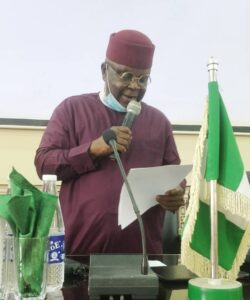
Director-general and Chief Executive Officer, National Centre for Technology Management (NACETEM), Engr Prof Okechukwu Ukwuoma
Prof Ukwuoma further explained that the workshop is organized to promote synergy in Science, Technology and Innovation and to create jobs for national development.
He said: “This workshop is a bold attempt by NACETEM as a government institution to bring together the key actors in the NIS – Government, Industry and the Academia – with a view to discussing practicable ways to address the apparent disconnect among these actors. Without doubt, synergy among the actors will bring about radical change in our approaches to deployment of science, technology and innovation to the achievement of sustainable development, particularly in Nigeria.
“NACETEM is an Agency of the Federal Ministry of Science and Technology saddled with the responsibility of providing critical knowledge support in the area of STI management through policy research, capacity building, science, technology and innovation advisory services, databank of STI resources, among others.
“This workshop is one of the ways of fulfilling the Agency’s mandates of reaching out to the teeming public, particularly in capacity building and advisory services” he said
-
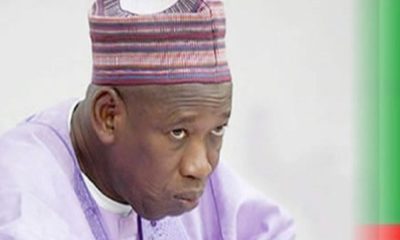
 News3 days ago
News3 days agoAPC National Chairman: Moves To Oust Ganduje Put Presidency In Quandary
-
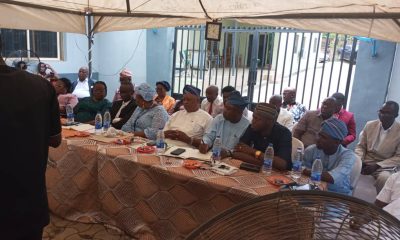
 News2 days ago
News2 days agoOsun RAAMP Opens Bid For Road Constructions Statewide
-

 News4 days ago
News4 days agoComrade Joseph Sangosanya dies at 67
-

 Opinion2 days ago
Opinion2 days agoRegulatory Commission Must Wakeup From Slumber To Rescue EKEDC From The Shackles Of Dere Otubu By ADAPHAI


